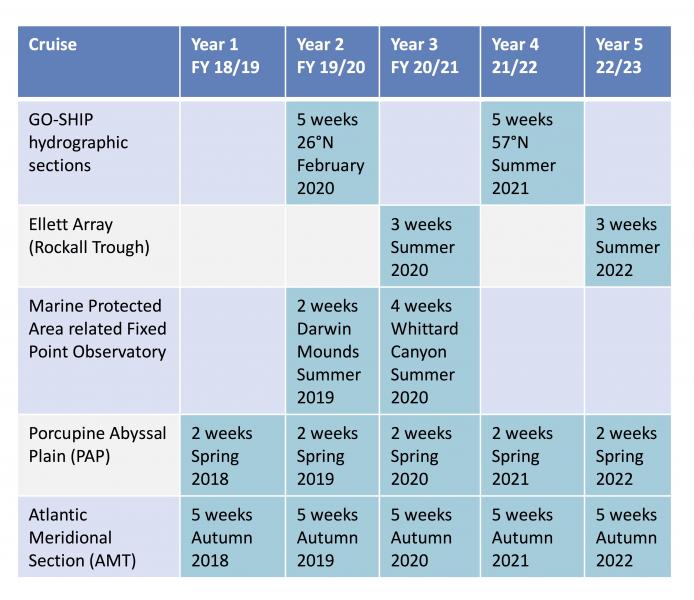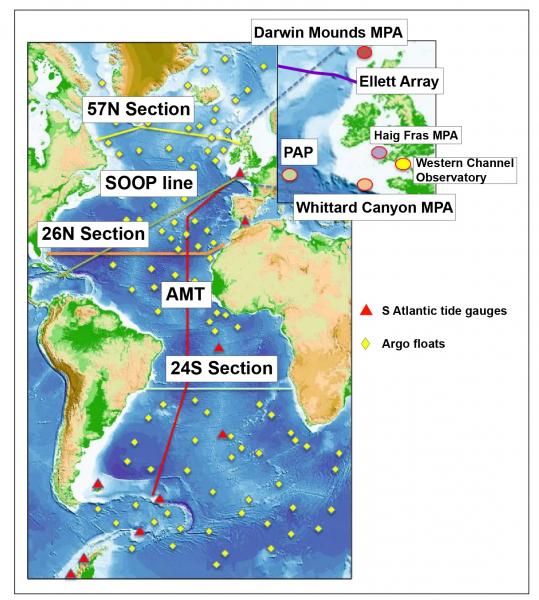CLASS links existing long-term observational programmes into a comprehensive, integrated pan-Atlantic observing system that contributes to a globally coordinated programme of sustained observations.
Hydrography (ocean circulation and heat and freshwater transport)
We will conduct three full depth hydrographic sections in each 5-year period, as the UK’s contribution to GO-SHIP. The sections are at 26°N, 57°N and 24°S and complement the Atlantic Meridional Overturning Circulation (AMOC) observations made by the RAPID array, and the OSNAP and UK-OSNAP array. They provide observations and insight in support of other NERC National Capability programmes ACSIS (focused on the Atlantic) and ORCHESTRA (focused on the Southern Ocean and which includes the long running Drake Passage repeat section).
The Ellett Array uses moorings, gliders and ship-based hydrography to observe the warm-water pathways of the AMOC, located in the Rockall Trough and the Hatton-Rockall Basin. The Ellett Array builds on 40 years of observations of the Extended Ellett Line programme, and 70 years of surface temperature and salinity observations in the Rockall Trough.
Surface biology and biogeochemistry
The AMT, a pan-Atlantic sampling programme (UK to the Falkland Islands) operating since 1995, provides observations of the structure and biogeochemical properties of planktonic ecosystems and access to the South Atlantic subtropical gyre (a key under-sampled region)
A ship of opportunity (SOOP) makes monthly transects from the UK to the Caribbean (see map below), providing surface water biogeochemical observations to CLASS. This route has been operating since 2003 and is a UK contribution to ICOS.
The Continuous Plankton Recorder (CPR) is a large-scale global survey that provides basin-wide and long-term measurement of the ecological health of marine plankton. Established in 1931, the CPR survey is the longest running and most geographically extensive marine ecological survey in the world.
Global climate
We will integrate our Atlantic-sector observations and strengthen international observing programmes through our contribution to global ocean climate and carbon-observing programmes, including the surface based ICOS, ICOADS and GLOSS programmes, and Argo.
Fixed point observatories
We maintain a network of fixed-point observatories (FPOs) to underpin research into the impacts of North Atlantic basin-decadal scale oceanographic processes on the UK. Time series observations for water column biogeochemistry, seafloor biodiversity and sediment transport will be collected at four UK shelf and slope sites, including three Joint Nature Conservation Committee (JNCC) designated Marine Protected Area sites and the Western Channel Observatory (WCO). We will also maintain the key deep water site at the Porcupine Abyssal Plain (PAP). Both the WCO and PAP have been regularly sampled for decades as part of Marine National Capability, and are ICOS designated Fixed Point Observatories. The three MPA sites have previously been sampled on an ad hoc basis in partnership with Defra, JNCC and Cefas, however, the inclusion of all five sites will allow us to obtain a more coherent picture of temporal change and responses to and/or recovery from anthropogenic impacts.
CLASS research cruise programme and opportunities
The CLASS research cruises are listed in this table and the locations shown on the map. CLASS will be making berths available for Early Career Researchers on our cruises – see the Engagement page for more information about how and when to apply.

